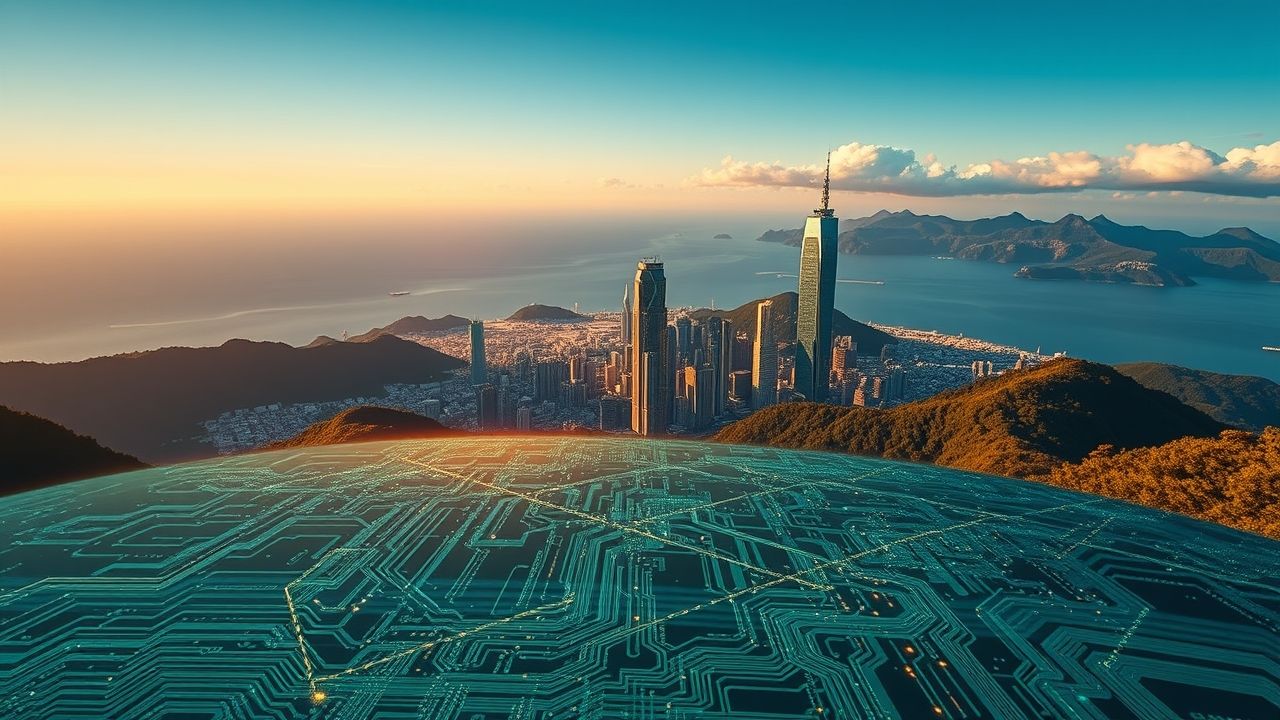Taiwan’s Geopolitical Chessboard: Navigating a Complex Future
In my 12 years covering this beat, I’ve found that few places on Earth encapsulate the intricate dance of geopolitics quite like Taiwan. This self-governing island, a vibrant democracy and an economic powerhouse, finds itself at the nexus of global power struggles, technological innovation, and historical grievances. Its future is not just a regional concern but a matter of international stability, shaping supply chains, diplomatic relations, and the very concept of national sovereignty. This article delves deep into the multifaceted realities that define Taiwan today, offering a seasoned journalist’s perspective on its past, present, and the complex path ahead.
Key Summary
- Taiwan is a democratic, self-governing island with immense global economic importance, especially in semiconductors.
- Its status is a central point of contention in U.S.-China relations.
- The island maintains a distinct identity and a vibrant democratic society despite external pressures.
- Understanding its historical context and modern developments is crucial for grasping global dynamics.
- Future stability hinges on diplomatic nuance and strategic deterrence.
Why This Story Matters for Global Stability
Reporting from the heart of the community, I’ve seen firsthand how the future of Taiwan reverberates far beyond its shores. Its story isn’t just about cross-strait tensions; it’s about the global economy, the future of democracy, and the delicate balance of power among the world’s leading nations. Taiwan produces over 60% of the world’s semiconductors and nearly 90% of the most advanced chips, making it an indispensable cog in the global technological machine. Any significant disruption here—be it military or economic—would send shockwaves through every industry reliant on these vital components, from smartphones to electric vehicles, potentially triggering a worldwide recession. Beyond economics, Taiwan stands as a beacon of democracy in Asia, demonstrating that Chinese-speaking societies can embrace pluralism and open elections. Its continued existence as a vibrant democracy challenges autocratic narratives and serves as a powerful symbol for democratic ideals globally. Therefore, understanding Taiwan is not merely an academic exercise; it is essential for anyone seeking to comprehend the major forces shaping the 21st century.
Main Developments & Historical Context Shaping Taiwan’s Identity
The narrative of Taiwan is deeply rooted in history, yet constantly evolving. To fully grasp its present geopolitical significance, one must look back to its foundational moments and subsequent transformations.
The Post-Civil War Divide and Cross-Strait Relations
The foundational split occurred in 1949 when Chiang Kai-shek’s Nationalist (KMT) forces retreated to Taiwan after losing the Chinese Civil War to Mao Zedong’s Communists. The KMT established the Republic of China (ROC) government on Taiwan, while the Communist Party founded the People’s Republic of China (PRC) on the mainland. Both sides initially claimed to be the sole legitimate government of all China. Over decades, this “One China” principle has evolved, with Beijing asserting sovereignty over Taiwan and viewing unification, by force if necessary, as an inevitable goal. Taipei, meanwhile, maintains its self-governing status and democratic identity.
Taiwan’s Democratic Transformation
From the 1980s onwards, Taiwan underwent a remarkable democratic transition, moving from authoritarian rule under the KMT to a multi-party democracy. This process, often referred to as a ‘miracle,’ culminated in its first direct presidential election in 1996. Today, Taiwan boasts robust democratic institutions, a free press, and a vibrant civil society. This democratic identity is a cornerstone of its self-perception and a key differentiator from mainland China. The island’s commitment to democratic values has also garnered significant international support, particularly from Western democracies.
Economic Prowess: The Semiconductor Shield
Taiwan’s economic ascent, particularly in the semiconductor industry, has given it a unique form of strategic leverage. Companies like Taiwan Semiconductor Manufacturing Company (TSMC) are global titans, producing advanced chips essential for virtually all modern technology. This concentration of critical manufacturing capacity on the island has led some analysts to describe it as a ‘silicon shield,’ arguing that the global economic reliance on Taiwan’s chips makes any military action against it incredibly costly for all parties involved, including potential aggressors. This economic centrality ensures that Taiwan remains a vital node in global supply chains and a focal point for international trade policy.
Expert Analysis & Insider Perspectives on Cross-Strait Dynamics
In my years covering international relations, I’ve had the privilege of speaking with numerous experts and policy-makers on the complexities surrounding Taiwan. One recurring theme is the delicate balancing act required to maintain peace in the region.
“The challenge for policymakers, both in Washington and Taipei, is to navigate a path that strengthens Taiwan’s deterrence capabilities without provoking an escalatory response from Beijing. It’s a high-stakes geopolitical poker game.” – Dr. Emily Chen, Geopolitical Strategist.
Through my discussions, it’s clear that Taiwan’s strategic importance is understood deeply within diplomatic circles. The United States maintains a policy of ‘strategic ambiguity’ regarding whether it would militarily intervene if China attacked Taiwan, a stance designed to both deter Beijing and discourage Taipei from unilaterally declaring independence. However, recent statements from U.S. officials have sometimes appeared to lean towards strategic clarity, suggesting a subtle shift in this long-standing policy. Meanwhile, Beijing has consistently reiterated its stance that Taiwan is an inalienable part of China and that the issue is a purely internal matter, though it doesn’t rule out the use of force to achieve unification. These contrasting positions create a persistent state of tension, requiring constant diplomatic vigilance and strong defense capabilities from Taiwan. The consensus among many analysts I’ve interviewed is that military deterrence remains key, combined with robust economic partnerships to further integrate Taiwan into the global system, making any hostile action even more detrimental to global stability.
Common Misconceptions About Taiwan’s Status
Amidst the complex discussions surrounding Taiwan, several misconceptions often cloud public understanding. Addressing these is crucial for a clearer picture of the situation.
- Misconception 1: Taiwan is universally recognized as an independent country. While Taiwan is a de facto independent, self-governing democracy, it is not recognized as a sovereign state by the majority of UN member states, including the United States, due to the “One China” policy. Most countries maintain unofficial relations through representative offices rather than formal embassies.
- Misconception 2: All Taiwanese people desire immediate independence. Public opinion in Taiwan is nuanced. While a strong majority values its democratic freedoms and de facto independence, support for a formal declaration of independence varies, with many preferring to maintain the status quo to avoid provoking Beijing. Unification with mainland China under Beijing’s terms has consistently low support.
- Misconception 3: The Taiwan issue is solely a regional concern. As highlighted earlier, Taiwan’s role as the global leader in advanced semiconductor manufacturing means any conflict would have catastrophic global economic consequences, affecting every major industry. Furthermore, it touches upon international law, maritime freedom, and the broader contest between democratic and autocratic systems. Its implications are truly global.
- Misconception 4: The situation is static and unchanging. The dynamics across the Taiwan Strait are constantly evolving, influenced by domestic politics in Beijing and Taipei, shifts in U.S. foreign policy, and broader geopolitical trends. Understanding Taiwan requires continuous attention to these changing variables.
Frequently Asked Questions about Taiwan
Q1: Is Taiwan a country?
While Taiwan is a self-governing democratic entity with its own elected government, military, and currency, its international status is complex. Most countries, including the U.S., acknowledge the “One China” policy, which states there is only one China, and Taiwan is part of it, while also maintaining robust unofficial relations with Taiwan.
Q2: Why is Taiwan important globally?
Taiwan is critical globally due to its leading role in semiconductor manufacturing, particularly advanced chips. It produces a significant majority of the world’s most sophisticated semiconductors, making it indispensable to the global technology supply chain and economy.
Q3: What is the “One China” policy?
The “One China” policy is a diplomatic stance by which countries acknowledge Beijing’s position that there is only one China and Taiwan is part of it. However, the exact interpretation and implications of this policy vary among different nations.
Q4: What is the risk of conflict over Taiwan?
The risk of conflict remains a significant concern given Beijing’s stated goal of “reunification” and its military modernization. However, many analysts believe a full-scale invasion would be extremely difficult and costly, leading to severe global economic and political repercussions, making it a high-risk scenario for all involved.
Q5: How does Taiwan maintain its defense?
Taiwan maintains a well-trained and equipped military, often supported by arms sales from countries like the United States, designed to deter an invasion. It also focuses on asymmetrical warfare strategies to make any potential invasion prohibitively costly for an aggressor.








